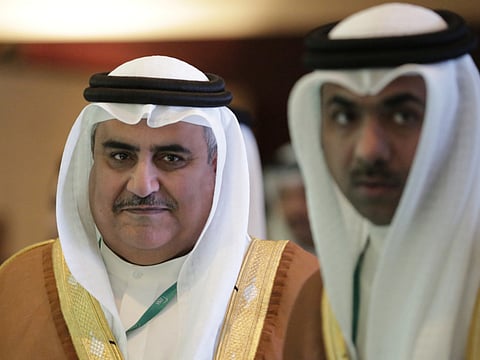Daesh can be defeated only by a unified Syrian front
Better relations between GCC, Iran require positive attitudes from Tehran

Manama: Bahrain’s Foreign Minister rejected claims that the presence of Daesh in Syria was an impediment to a political solution in the war-torn country and insisted that Syrian unity was the basis for a political settlement.
“We believe the solution in Syria must be based on returning Syrians to a state of unity as soon as possible,” Shaikh Khalid Bin Ahmad Al Khalifa said.
“World powers along with regional states must work to set up a transitional governing body that preserves the civilian and military state institutions and includes all relevant Syrian groups, and this can then pave the way for Syrians to decide the future of their country,” he said at the Manama Dialogue, an international security conference held annually in the Bahraini capital.
The political solution must be approached with the same determination and effort as the fight against terrorists, he added.
“There are those who will say that we must defeat Daesh first before any of this can take place. But Daesh can only be defeated by a unified Syrian front against it; the presence of Daesh in Syria is not an impediment to a political solution between the Syrians, it is what makes the necessity of a political solution all the more pressing.”
Shaikh Khalid said that the situation in Syria was the most pressing challenge in the region.
“It is perhaps the crisis of the decade, and the effects of this crisis are not limited to this region. The key challenge in Syria is not merely the existence of terrorist groups such as Daesh, Hezbollah, and Jabhat Al Nusra. The emergence of these groups is a symptom of what is wrong in Syria, not the primary cause,” he said.
“The challenge in Syria is the loss of Syrian unity and the disintegration of the tolerant societal bonds that held a multi-sect Levant together for hundreds of years. A vacuum was created in Syria when the response to popular demonstrations in 2011 resulted in the destruction of cities and the displacement of millions of innocent Syrians. This vacuum allowed Daesh to establish strongholds, and then use those territories as a launching pad for their invasion of Iraq. The deteriorating situation in Syria left normal Syrians suddenly facing a world where the sect you happened to be born into could possibly determine whether you lived or died.”
This vacuum was filled not only by terrorist organisations, but also by regional states seeking their own hegemonic aims, he added.
“The continuing proliferation of terrorist organisations in the region remains a serious concern. Besides Iraq, Daesh has expanded its operations into places like Libya and Nigeria through declarations of loyalty by already established terrorist organisations and the establishment of so called ‘Wilayat’. Daesh has also claimed responsibility for terrorist attacks on mosques in the Kingdom of Saudi Arabia and Kuwait, giving us a glimpse of the type of organisation Daesh could evolve into even if it is defeated militarily in Syria and Iraq,” he said.
Shaikh Khalid added that “Daesh is not the only terrorist threat we face in the region.”
“Over the past couple of years, the Islamic Republic of Iran has provided sanctuary and financial support for those charged with conducting terrorist acts in Gulf Cooperation Council (GCC) states. Closer to home, Iran has hosted Bahraini citizens in IRGC [Islamic Revolutionary Guard Corps] training camps where potential terrorists learn skills such as IED [improvised explosive device] construction, marksmanship, and weapons smuggling. Iran has also conducted smuggling operations to bring in explosives and weapons including C-4, claymore mines, and AK-47 assault rifles,” he said.
As a result, over the past couple of years, 439 IEDs have been found and safely disposed, or have exploded causing injuries, killing 16 police officers and injuring thousands, the minister added.
“These actions along with the terrorist attacks conducted by Hezbollah and its proxies across the region are no less a threat to us than Daesh and Al Qaida.”
In his remarks about better relations between the GCC and Iran, Shaikh Khalid said that “the ball is firmly in Iran’s court”.
“We in Bahrain and the GCC have repeatedly expressed our willingness to engage and improve our relations with Iran. We sincerely believe this to be mutually beneficial, but not at the expense of regional stability and certainly not when Iranian officials publicly boast about having captured four Arab capitals through their Islamic Revolution,” he said.
“The international community must come together, just as it did to contain, and hopefully pacify, Iran’s nuclear programme, to put an end to Iran’s interference in the affairs of regional states. We must not underestimate the damage to regional stability caused by Iran’s actions in the region. If we are not serious enough about this, I am afraid we will remain in a state of conflict indefinitely,” he said.



